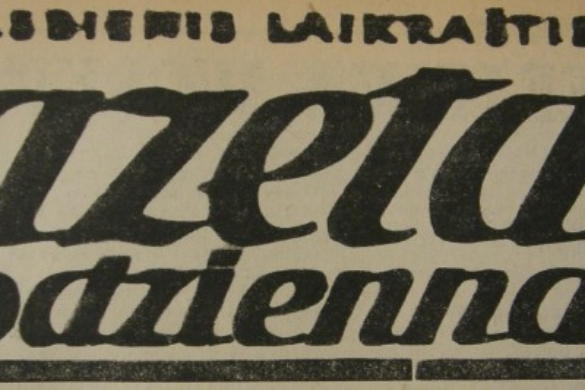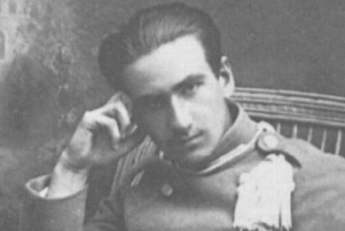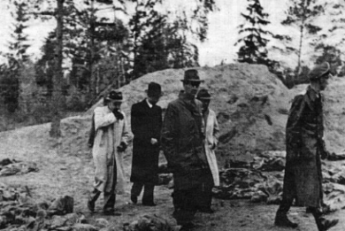
“Gazeta Codzienna” (eng. Daily newspaper)
“Gazeta Codzienna” was published in Vilnius from November 25, 1939 to August 20, 1940. Bolesław Szyszkowski was the publisher of the daily, and Józef Mackiewicz was the editor-in-chief. It was one of three Lithuanian newspapers published in Polish. Its pages were supposed to announce the internal policy program “Live and let live” and Mackiewicz’s “national idea”.
After the Soviets entered Poland, Józef Mackiewicz fled to Kaunas, but in November 1939, after the Lithuanians took over Vilnius, he returned to Vilnius. He immediately began efforts to obtain permission to publish a newspaper in Polish in Vilnius.
As Mackiewicz recalled the beginnings: “On the corner of Wileńska Street and the Dobroczynny Alley, there was a small and very dirty “Louvre” bar, in such a place, in December 1939, three of us sat down over vodka and sausages with cabbage, with the sincere intention of influencing the fate of eastern of Europe”. “The three of us” means Józef Mackiewicz, as well as Leon Bortkiewicz, an enthusiastic ideologue and Zygmunt Dziarmaga, a former Warsaw ONR conspiracy activist and a former administrative employee of “Słowo” in Warsaw. The plan that Mackiewicz set out was as follows: in addition to the overt activity of “Gazeta Codzienna”, develop a conspiratorial one, aimed at uniting all national forces to fight Bolshevism. Dziarmaga and Bortkiewicz also aimed to counteract the slanderous action against J. Mackiewicz, engage young people, establish and maintain contacts with Belarusians. Bortkiewicz was to be a secretary in the newspaper, and Dziarmaga was to take over its distribution. However, everything ended unfortunate, with betrayal by his comrades: Bortkiewicz quickly turned into a communist who taught the principles of Leninism and Stalinism. Similarly, Dziarmaga deceived with the secret of his actions for a long time, until he began to live from the distribution of Soviet newspapers in Vilnius.
The Lithuanian side treated Mackiewicz’s personality favorably: “Who, if anyone, but Józef Mackiewicz should be given permission” – so shouted the head of the poviat, Colonel Szlepetys, but when the matter was coming to an end, it turned out that the concession had already been issued to Bolesław Szyszkowski and Mackiewicz was to negotiate with him. In the end, Mackiewicz agreed for the following reasons: Lithuanian laws provided for a licensing system not only for newspaper publishers, but also for editors. From the moment Mackiewicz becomes co-publisher and at the same time approved editor, he becomes the complete master of the newspaper, and thus Szyszkowski’s influence is excluded.
It was also unclear about the cash that was needed to start publishing the newspaper. Kemezys offered a loan from the Bank of Lithuania. Mackiewicz was distrustful of this proposal, but Kemezys explained that the loan was open to all Vilnius newspapers. When it turned out that Staniewicz had borrowed 10,000 litas from the Bank of Lithuania for “Kurier Wileński”, Mackiewicz decided to ask for a monthly loan of 2,000 for promissory notes, which were redeemed on time. and hr. Żółtowski, an agent of the government-in-exile in Angers, secured a financial catastrophe by giving Gazeta Codzienna a subsidy.
Mackiewicz understood that Vilnius was no longer Polish, but he believed that one should be glad that it was not under the rule of the Bolsheviks or the Nazis. On the other hand, most Poles decided that Vilnius was under Lithuanian occupation and any dialogue with the occupier was a national betrayal. Mackiewicz, in their opinion, was such.
Hence, the society’s attitude towards the newspaper was different: the spheres grouping around “Kurier Wileński” accused Mackiewicz of “taking money from Lithuanians”, that the magazine was a Lithuanian “reptile” and that he obtained permission to publish it only through his deals with Lithuanians. On the other hand, Mackiewicz himself often complained about the strong Lithuanian censorship, which mercilessly trimmed the newspaper. The Lithuanian authorities did not want to hear about any “nationality” in the newspaper, it was not allowed to quote Lithuanian newspapers verbatim in the newspaper, it was also not allowed to reprint opposition articles from the Jewish press (because Poles did not have as many rights as Jews), it was not allowed to argue wittily with Lithuanian press or ridicule any Lithuanian writer, it was forbidden to write about “spring”, because spring was supposed to mean the return of Poles, it was forbidden to cancel proofreading errors in the next issue, etc.
Mackiewicz’s newspaper often had difficulties. At the beginning of 1940, she was punished for removing the initials from the imposed article, but thanks to the financial help of Count Michał Tyszkiewicz, who often supported the newspaper, she managed to get out of the crisis.
In May 1940, a Lithuanian policeman was murdered in Vilnius. The press office demanded that the murder of a policeman be condemned in “Gazeta”. Mackiewicz agreed to this only on the condition that “it will be allowed to condemn the fact of the pogrom of Poles” that took place after the policeman’s funeral. The next day, the Council of Ministers in Kaunas revoked Mackiewicz’s right to edit and publish any periodicals throughout the territory of the Republic of Lithuania.
Source:
Józef Mackiewicz, Prawda w oczy nie kole, 2002.







